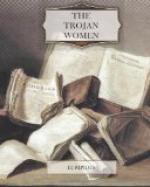[39] Three Crowns of Life.]—On the Judgment of Paris see Miss Harrison, Prolegomena. pp. 292 ff. Late writers degrade the story into a beauty contest between three thoroughly personal goddesses—and a contest complicated by bribery. But originally the Judgment is rather a Choice between three possible lives, like the Choice of Heracles between Work and Idleness. The elements of the choice vary in different versions: but in general Hera is royalty; Athena is prowess in war or personal merit; Aphrodite, of course, is love. And the goddesses are not really to be distinguished from the gifts they bring. They are what they give, and nothing more. Cf. the wonderful lyric Androm. 274 ff., where they come to “a young man walking to and fro alone, in an empty hut in the firelight.”
There is an extraordinary effect in Helen herself being one of the Crowns of Life—a fair equivalent for the throne of the world.
[40] Alexander ... Paris.]—Two plays on words in the Greek.
[41] The old Gate-Warden.]—He and the Watchers are, of course, safely dead. But on the general lines of the tradition it may well be that Helen is speaking the truth. She loved both Menelaus and Paris; and, according to some versions, hated Deiphobus, the Trojan prince who seized her after Paris’ death. There is a reference to Deiphobus in the MSS. of the play here, but I follow Wilamowitz in thinking it spurious.
[42] Chorus.]—On the Trojan Zeus see above, on p. 11. Mount Ida caught the rays of the rising sun in some special manner and distributed them to the rest of the world; and in this gleam of heavenly fire the God had his dwelling, which is now the brighter for the flames of his City going up like incense!
Nothing definite is known of the Golden Images and the Moon-Feasts.
[43] Towers of the Giants.]—The pre-historic castles of Tiryns and Mycenae.
[44] May Helen be there.]—(Cf. above.) Pitane was one of the five divisions of Sparta. Athena had a “Bronzen House” on the acropolis of Sparta. Simois, of course, the river of Troy.
[45] I make thee whole.]—Here as elsewhere Hecuba fluctuates between fidelity to the oldest and most instinctive religion, and a rejection of all Gods.
[46] Lo, I have seen the open hand of God.]—The text is, perhaps, imperfect here; but Professor Wilamowitz agrees with me that Hecuba has seen something like a vision. The meaning of this speech is of the utmost importance. It expresses the inmost theme of the whole play, a search for an answer to the injustice of suffering in the very splendour and beauty of suffering. Of course it must be suffering of a particular kind, or, what comes to the same thing, suffering borne in a particular way; but in that case the answer seems to me to hold. One does not really think the world evil because there are martyrs or heroes in it. For them the elements of beauty which exist in any great trial of the spirit become so great as to overpower the evil that created them—to turn it from shame and misery into tragedy. Of course to most sufferers, to children and animals and weak people, or those without inspiration, the doctrine brings no help. It is a thing invented by a poet for himself.




